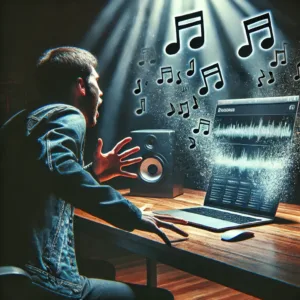Having your music used in a project without your permission is a nightmare scenario for any music producer. The unauthorized use of your work is a serious issue. It doesn’t matter if it’s featured in a Netflix series, an advertisement, or a social media post. It can leave you feeling violated and powerless. But, there are steps you can take to tackle the situation and protect your rights. This guide will walk you through what to do if your copyright is infringed upon. It blends real-world experiences with actionable advice.

Recognizing the Infringement
The first step is recognizing that your rights have been violated. This might seem straightforward, but it’s not always as simple as noticing your track in a popular TV show. Sometimes, producers might not even realize their work has been used without permission until months or even years later. For instance, imagine scrolling through Netflix, hearing a familiar melody, and realizing it’s your work—used without your consent. The first mix of excitement and pride can quickly turn into anger. You may also feel confusion when you realize you weren’t credited or compensated.
A producer discovered their track was used in a promotional video for a major brand. The video had already amassed millions of views before they even became aware of it. This delayed realization is not uncommon. This is especially true when music is used in contexts that might not initially be on the producer’s radar.
- Document Everything: As soon as you suspect your work has been used without permission, start gathering evidence. This might include recording the segment where your music is used. Take screenshots of the video. Note down any relevant details like the date of release and where the content was found.
- Verify the Infringement: Check if you’ve entered into any agreements. These could be directly made by you or through a third party. Such agreements might have authorized the use of your music. Miscommunication or forgotten contracts can sometimes lead to confusion. Make sure that no one else is licensing your music on your behalf without your knowledge.

Contacting the Offender
First, confirm that your music was used without permission. Next, contact the person or company responsible. This can be daunting, especially when dealing with large corporations or media entities. It’s tempting to lash out in frustration, but a calm and professional approach is often more effective.
A producer noticed their music was used in a popular TV series without permission. Instead of quickly threatening legal action, they first reached out with a polite email to the production company. They included clear evidence of the infringement and requested a discussion about proper compensation or credit. Unfortunately, their email was ignored, which led them to escalate the matter.
- Draft a Formal Notice: Your first contact should be formal and clear. Outline the issue. Give evidence of the unauthorized use. State your expectations—whether that’s compensation, removal of the content, or proper credit.
- Include Evidence: Attach all relevant evidence to your communication. Reference specific legal protections, including copyright laws that apply to your country.
- Set a Deadline: Give the offender a reasonable deadline (e.g., 10-14 days) to respond. This shows that you’re serious and expecting prompt action.

Seeking Legal Counsel
If the offending party doesn’t respond or refuses to compensate you, it may be time to seek legal counsel. Navigating the legal landscape can be complex and intimidating. Nonetheless, it’s often necessary to protect your rights. You may also need to pursue any potential damages.
After repeated attempts to resolve the issue amicably, a producer decided to hire an intellectual property (IP) lawyer. The lawyer helped them understand the legal implications of the infringement. The lawyer also guided them through the process of filing a formal complaint. This led to a settlement. The producer was compensated not only for the unauthorized use of their music. They also received compensation for the legal fees incurred during the process.
- Find an IP Lawyer: Look for a lawyer who specializes in copyright law and has experience with cases involving music. Many lawyers offer a free consultation to discuss your case.
- Discuss Your Options: Your lawyer will help you assess your options. These may include filing a lawsuit. Other options are negotiating a settlement or exploring another dispute resolution technique like mediation.
- Weigh the Costs: Legal action can be costly and time-consuming. Consider the potential outcomes and whether the financial and emotional toll is worth it. Sometimes a settlement out of court can be a quicker and more cost-effective solution.

Protecting Your Work Moving Ahead
After dealing with an infringement, it’s natural to want to protect your work more vigilantly in the future. Unfortunately, unauthorized use of music is not uncommon. There are several proactive steps you can take to reduce the risk.
One producer learned a hard lesson when their music was used without permission. From that point on, they began registering all of their tracks with the U.S. Copyright Office and signed up for digital rights management (DRM) services. These tools allowed them to watch where their music was being used and to claim ownership automatically.
- Register Your Music: Always register your tracks with the relevant copyright office. In the United States, this is the U.S. Copyright Office, which provides legal documentation of your ownership.
- Use Digital Rights Management (DRM) Tools: Services like Content ID on YouTube can help you track your music. Digital fingerprinting tools can also help you track your music across various platforms. These tools also allow you to monetize your music. This ensures you get paid for the use of your work.
- Create Contracts: When licensing your music, always have a written contract. It should clearly outline the terms of use, payment, and rights. Contracts offer legal protection and clarity for both parties.
Dealing with unauthorized use of your music is a challenging and often frustrating experience. By taking the right steps, you can protect your rights. You can also potentially get compensation. Remember, the key is to act quickly, document everything, and seek legal advice if necessary. Be proactive in protecting your work. In doing so, you can prevent future infringements. You can also make sure that your music is used only with your permission.




Leave a Reply